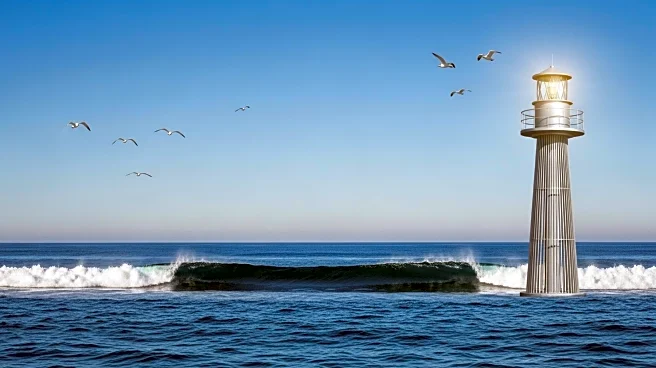What's Happening?
WISTA International has emphasized the importance of inclusivity in the maritime industry to drive environmental protection efforts. The organization highlights the theme of World Maritime Day, 'Our Ocean, Our Obligation, Our Opportunity,' underscoring the shared responsibility to safeguard the oceans. The oceans are vital for global survival, generating half of the planet's oxygen and absorbing significant carbon dioxide emissions. Despite their importance, oceans face threats from pollution, over-exploitation, and biodiversity loss. WISTA International President Elpi Petraki advocates for the shipping industry to lead in environmental protection by embracing diverse talent and perspectives. The International Maritime Organization (IMO) has established a robust regulatory framework to protect marine environments, including measures to limit air pollution and reduce greenhouse gas emissions from ships.
Why It's Important?
The emphasis on inclusivity in maritime environmental protection is crucial as it can lead to innovative solutions and better outcomes for the industry and the planet. The shipping industry, responsible for 80% of global trade, plays a significant role in environmental sustainability. By incorporating diverse perspectives, including those from women and under-represented groups, the industry can foster innovation and drive meaningful change. The IMO's regulatory efforts, such as the anticipated adoption of the Net-Zero Framework, aim to decarbonize shipping and mitigate climate change impacts. These initiatives align with United Nations Sustainable Development Goals, promoting gender equality and empowering women, which are essential for achieving broader environmental and social objectives.
What's Next?
The upcoming IMO Marine Environment Protection Committee (MEPC) Extraordinary Session is expected to formally adopt the IMO Net-Zero Framework, marking a decisive step towards decarbonization ambitions for shipping. This regulatory push will require leadership within the industry to model sustainable practices and inspire others. WISTA International's Environmental Committee, comprising experts from its 62 National WISTA Associations, is actively working to support global decarbonization efforts. The focus on inclusivity and diversity in decision-making processes, particularly involving coastal and island nations, is critical for effective ocean conservation strategies. These efforts will likely lead to increased engagement with sustainable goals and drive progress in environmental protection.
Beyond the Headlines
The push for inclusivity in maritime environmental protection highlights broader cultural shifts towards valuing diversity and challenging norms. This approach not only enhances innovation but also ensures that local knowledge and perspectives are integrated into global decision-making processes. The involvement of under-represented groups in environmental initiatives can lead to more comprehensive and effective solutions. Additionally, the alignment of maritime industry goals with United Nations Sustainable Development Goals reflects a commitment to achieving economic stability, social equity, and environmental protection. These efforts contribute to a more sustainable and equitable future, emphasizing the interconnectedness of environmental, social, and economic objectives.











